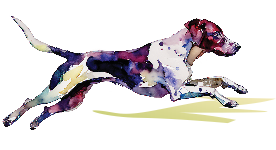VACCINATIONS AND PARASITIC TREATMENTS FOR YOUR DOG
Vaccination Protocols
An up-to-date veterinary vaccination record must be seen to ensure that your dog has current vaccinations against canine parvovirus, canine distemper, canine adenovirus/infectious canine hepatitis, leptospirosis and kennel cough. The current vaccination protocol recommended for dogs in the UK is 2 primary vaccinations 2 – 4 weeks apart, with the second vaccination not before they are 10 weeks of age. The full vaccination should be boosted 12 months after the primary course. After this time annual vaccination for Leptospirosis should be administered, with the main vaccine being repeated every 3 years. Primary vaccination courses must be completed at least 2 weeks before boarding. This also applies if vaccinating for the first time against kennel cough. This is to ensure that the vaccine has had long enough to take effect and provide the dog with adequate immunisation cover and to allow for shedding of any live vaccines. If the vaccination cover lapses and boosters are not administered at the prescribed time your dog is likely to need to restart the primary vaccination course, with a period of delayed effectiveness before they can be kennelled. Please contact your vet for further clarification.
Parasitic and worming treatment protocols
For the sake of your pet’s health (and your own) it’s important to keep your dog free from parasites; fleas, ticks, and worms. Your dog must be free of parasites when arriving to board with us, and if we find evidence of any infestation during their stay with us we are obliged to administer an appropriate treatment. The chemicals used in parasitic treatments for your pet contain powerful pesticides which are banned or strictly regulated in other fields such as agriculture/livestock.
Recent research in the UK has found that pesticides used in regular flea treatments are in 98% of English rivers at unsafe levels. These pesticides enter rivers from dogs swimming and also from dog owners shampooing dogs, washing bedding, stroking dogs and washing hands.
Recent research in the UK has also found that 100% of blue tit and great tit nests in the study were contaminated with pesticides from pet flea treatment, as the birds collect fur from dogs and cats to insulate their nests, leading to the death of fledglings. These pesticides are also leading to the widespread collapse of bee populations.
Over-treating for parasites with broad-spectrum pesticides is reportedly leading to developed resistance meaning the treatments are becoming less effective.
A few suggestions….
● Speak to your vet.
● Please consider whether your dog actually needs a monthly flea treatment as is often prescribed within an annual health plan.
● The risk to your dog of infestation can depend on lifestyle, the season etc, so discuss treatment options with your vet to minimise environmental risks – monthly chemical treatments are not the only option.
● Don’t use a spot-on treatment.
● Keep your dog in good shape so that their natural immune system helps keep parasites off through diet, exercise and mental health.
● Consider only treating when infected (but before an infestation becomes a problem and potentially leads to heavy use of treatments for your pet and your home) and use these chemicals sparingly and in a targeted way.
● Check vigilantly for ticks, fleas and worms.
● If you wash your dog, or they swim, don’t use a spot-on treatment. Use an injectable treatment which should be safer (for example Bravecto Injectable) or an orally administered treatment.
● Check if there is a recommended timescale during which your dog shouldn’t be washed or swim after administering ANY treatments.
● Please don’t use a flea collar on your dog when bringing them to board with us.
● Don’t leave your pet’s hair for wildlife to use as nesting materials. Groom your pet indoors, or collect hair after grooming outside and dispose of it safely.
● Dispose of the packaging safely and return unused products to your vet.
